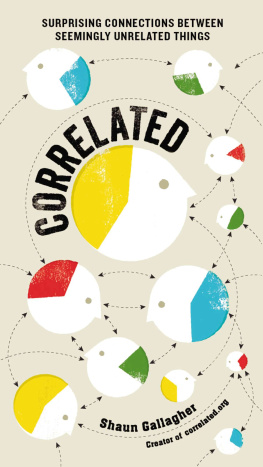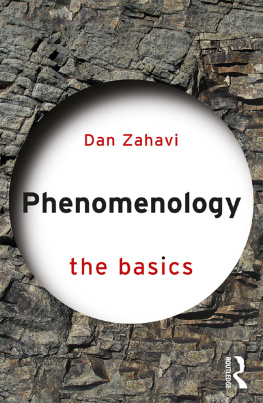Shaun Gallagher - Phenomenology
Here you can read online Shaun Gallagher - Phenomenology full text of the book (entire story) in english for free. Download pdf and epub, get meaning, cover and reviews about this ebook. year: 2022, publisher: Springer International Publishing, genre: Religion. Description of the work, (preface) as well as reviews are available. Best literature library LitArk.com created for fans of good reading and offers a wide selection of genres:
Romance novel
Science fiction
Adventure
Detective
Science
History
Home and family
Prose
Art
Politics
Computer
Non-fiction
Religion
Business
Children
Humor
Choose a favorite category and find really read worthwhile books. Enjoy immersion in the world of imagination, feel the emotions of the characters or learn something new for yourself, make an fascinating discovery.
- Book:Phenomenology
- Author:
- Publisher:Springer International Publishing
- Genre:
- Year:2022
- Rating:4 / 5
- Favourites:Add to favourites
- Your mark:
- 80
- 1
- 2
- 3
- 4
- 5
Phenomenology: summary, description and annotation
We offer to read an annotation, description, summary or preface (depends on what the author of the book "Phenomenology" wrote himself). If you haven't found the necessary information about the book — write in the comments, we will try to find it.
Phenomenology — read online for free the complete book (whole text) full work
Below is the text of the book, divided by pages. System saving the place of the last page read, allows you to conveniently read the book "Phenomenology" online for free, without having to search again every time where you left off. Put a bookmark, and you can go to the page where you finished reading at any time.
Font size:
Interval:
Bookmark:

The Palgrave Philosophy Today series provides concise introductions to all the major areas of philosophy currently being taught in philosophy departments around the world. Each book gives a state-of-the-art informed assessment of a key area of philosophical study. In addition, each title in the series offers a distinct interpretation from an outstanding scholar who is closely involved with current work in the field. Books in the series provide students and teachers with not only a succinct introduction to the topic, with the essential information necessary to understand it and the literature being discussed, but also a demanding and engaging entry into the subject.

The Palgrave Macmillan logo.
Cover illustration: Mint Images Limited / Alamy Stock Photo
This Palgrave Macmillan imprint is published by the registered company Springer Nature Switzerland AG
The registered company address is: Gewerbestrasse 11, 6330 Cham, Switzerland
To Elaine.
Before you started to read this line of text you were doing something else. Perhaps you just came back from surfing and are sitting on a beach chair; perhaps you have just found a spot in the shade and you have 2 hours to sit and read and sip your wine before the concert starts in Luxembourg Gardens; perhaps you have just made a cup of tea and are settling into your armchair in front of your warm hearth. Or maybe youre in a jet airliner reading this on the latest electronic text-display gadget. In any and all cases you find yourself already situated, in the middle of something, or having just done somethingpulled up a chair, taken a seatand you are now at a point where you are reading these lines.
Phenomenology begins right here, with one of the oldest problems in philosophy, which is also one of the most contemporary problems in science. It begins with the fact that we, as agents who must act, and as thinkers who try to get a grasp on what we are doing, are always already situated in the world. Its this problem that leads Aristotle to acquiesce in accepting the inevitable, namely, in this life we can only live in the second-best waythe imperfect practical life, since the very best form of life, the life of self-sufficient contemplation is never fully attainable. We are constantly being interrupted by the demands of our physical nature and the distractions of the world. If by enormous effort we turn our attention away from food and sex and survival and attempt to study our rational capacitiesour quest for reasons, our natural inclination to know everything (whether by science or gossip)we are confronted with the very first fact, which is that there is no very first fact, and that every fact is preceded by other facts, that every fact, every reason, every thought, every instance of consciousness is already situated in some contingent circumstance.
With respect to the history of philosophy it is usually thought that phenomenology informed the later development of existentialism (in thinkers like Heidegger , Sartre , Camus , etc.). This is certainly true. But it is also true that the original motivation for phenomenology was itself an existential onethe already being-in-a-situation, the thrownness , the facticity of our existence. This thoughtthis situationis one that phenomenology begins with, and the one it eventually returns to. In between, like all great philosophies, it attempts to clear a space, to find a place from which it can survey this very situation of being situated. In this regard phenomenology both succeeds and fails in interesting ways. It continues to do so, since it is not merely a piece of history or a tradition, but is also something that continues to be practiced.
In this book Ill take a pragmatic approach to phenomenology. The focus will be on phenomenology as a philosophical and interdisciplinary practice. Accordingly, my primary intention is not to rehearse the history of phenomenology as a philosophical movement (although I will not ignore this completely). Rather Ill focus on its methods and what Edmund Husserl (18591938), the founding father of phenomenology, called the things themselvesthe ways in which the world comes to be experienced within the various situations that make up our lifeworld . The lifeworld (Lebenswelt) is one of phenomenologys basic concepts. Its connected to the fact that we are already situated in the world. It is the collection of situations in which we find ourselves involvedit is the world as we live it, not just the world as it opens up in front of us as perceiving subjects, not just the world as we know it, but the world which is at the same time something already there operating as the meaningful background for all of our actions and interactions and attempts to gain knowledge. The lifeworld is the world we take for granted, rather than the world as we study it through science, or represent it through art. The lifeworld , in this sense, is not the world that we take as object, as something distinct from ourselves, but is rather a specification of our existence.
In a world where there is no very first fact, there are several factors that nonetheless seem basic and that constitute our human way of being. Lets call these primary facts and note one of these primary facts about the lifeworld (and therefore about our existence)a primary fact that will clear away at least one serious misconception about phenomenology. The lifeworld is, from the start of our existence, already populated with other people. Before we have a chance to think about thisbefore we have a chance to theorize, philosophize or phenomenologize, before we have a chance to stake out a position of any sortour capabilities for so doing have already been shaped by other humans who have been with us even before our birth, who have been talking to us even before we could respond, and who have been interacting with us even before we could act on our own. This primary fact, and the
Font size:
Interval:
Bookmark:
Similar books «Phenomenology»
Look at similar books to Phenomenology. We have selected literature similar in name and meaning in the hope of providing readers with more options to find new, interesting, not yet read works.
Discussion, reviews of the book Phenomenology and just readers' own opinions. Leave your comments, write what you think about the work, its meaning or the main characters. Specify what exactly you liked and what you didn't like, and why you think so.
















